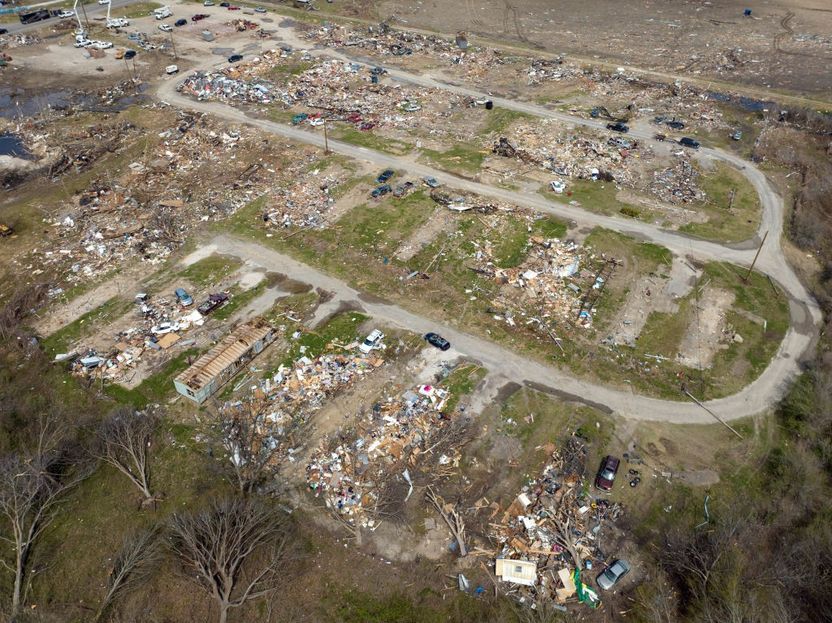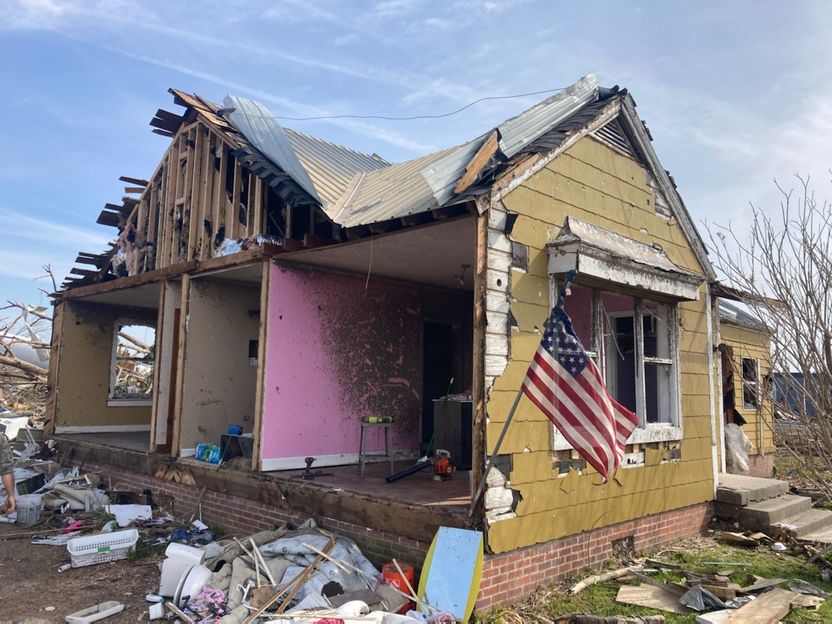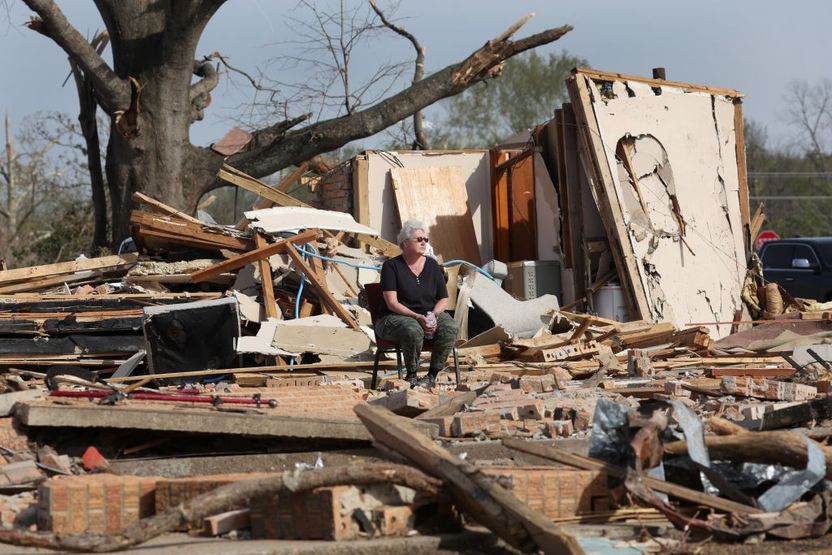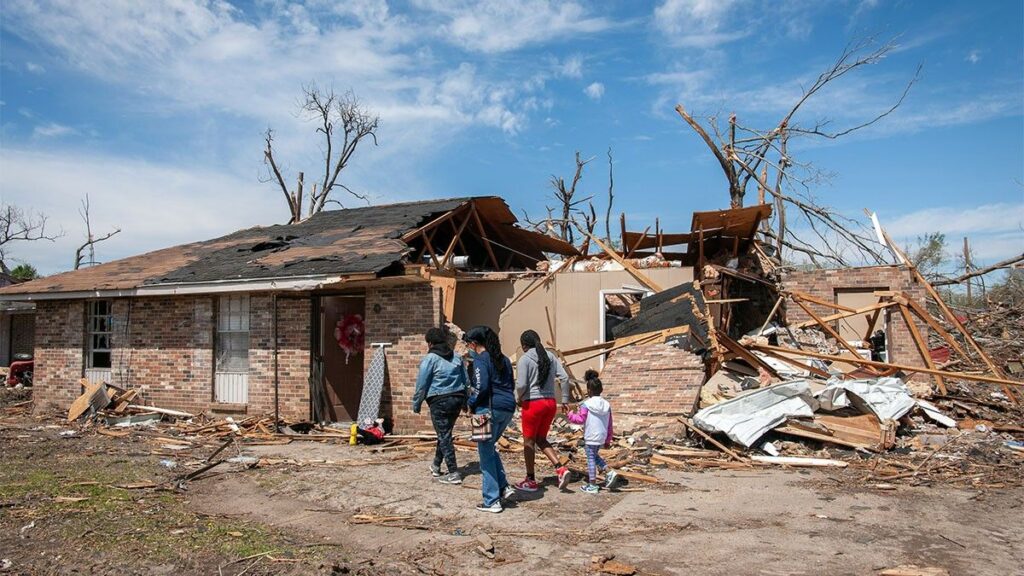
Rory Doyle/Bloomberg via Getty Images
Amid the wreckage in a small Mississippi town devastated by a deadly tornado, many local officials have vowed to rebuild. But the road to recovery in Rolling Fork is likely to be longer and filled with more pitfalls than many could have imagined.
At least 13 people were killed in Rolling Fork when a powerful twister cut through the economically depressed town of about 2,000 on Friday night. Restaurants, a lumber company, and a furniture store, were leveled, along with many of town’s homes. The tornado cut across 170 miles, reaching into Alabama as well, ultimately causing a total of 26 deaths in the two states. But Rolling Fork was the town hit hardest.
“It’s tragic and seemingly random,” says Tom Larsen, senior director at CoreLogic, specializing in natural risks. “It’s the rare and tragic times when we see [a tornado] hit a community.”
For years, jobs and locals have been leaving Rolling Fork—a poor community in the Mississippi Delta, surrounded by farmland. Now remaining residents are holed up in hotel rooms miles away or in National Guard or other shelters, as they await temporary housing from FEMA and other government agencies.

Rory Doyle/Bloomberg via Getty Images
But with their homes and businesses gone, many locals could be running out of reasons to stay—although local officials are pledging to rebuild.
“We’re going to come back,” says Sam Matthews, 74, one of five district supervisors in sparsely populated Sharkey County. His district represents part of Rolling Fork. “It’s going to be tough, but we’re coming back.”
Matthews, a retired chemical-plant worker, survived the tornado by sheltering with his girlfriend in the hallway of the Rolling Fork home he had lived in for 30 years. It was the only area in the four-bedroom house that didn’t have windows. It was also all that survived.
“It sounded like a train,” Matthews says of the tornado. He estimates the onslaught lasted about two-and-a-half minutes. “I was thinking something’s going to fall and hit me on the head any minute.”
When the twister finally moved on, the rain saturated everything that hadn’t blown away. His car, like most of his home, was destroyed.
“I don’t believe I’ll be able to save anything,” says Matthews, who met with his home insurance adjuster on Thursday. “We are not the poorest county, but we are awfully close. This is devastating for us here.”
Sharkey County Supervisor Jessie Mason told The Wall Street Journal that he believes Rolling Fork will eventually be rebuilt.
“But will it come back like it was? Probably not,” he told the Journal. “Some people are going to cash out and move on.”
What will happen to Rolling Fork’s real estate market?

Courtesy of Mark DiBiase
Ironically, natural disasters often boost the value of homes and rentals that were left unscathed. This is due to a lack of available housing. There isn’t much housing available between Greenville, MS, about 40 miles north, and Vicksburg, MS, about 45 miles south, says Julie Patton Johnson, a Keller Williams real estate agent. That’s going to put a premium on housing as displaced residents compete over places to live, while they rebuild or figure out their next steps.
The local economy could also benefit from that temporary influx of workers and aid money circulating through community. But eventually, those workers will move on and the aid will slow. Without steady jobs, the economy could be worse shape than it was before the tornado.
“This community was just holding on,” says Larsen, of CoreLogic. “Rebuilding a home won’t create [permanent] jobs in the area.”
But over the longer-term, home prices could decline even further. If more people leave the community, there will be even fewer potential homebuyers to keep prices strong.
“You may see a short-term increase in the value of housing. … but over the long term, as people move out, there will be less demand and [real estate] values will go down,” says Jesse Keenan, a professor of sustainable real estate at Tulane University in New Orleans.
Communities such as Rolling Fork thrived in the early 20th century, back when “cotton was king,” says Patton Johnson. There was even a train depot in town. But when farming equipment modernized and fewer farm workers were needed, the populations in places like Rolling Fork dwindled. Without other strong industries, people left and there weren’t new ones moving in and seeking housing. That lack of demand has kept real estate prices low.
The median list price for a home in Rolling Fork was $87,250—about one-fifth of the national price tag of $414,950 in February, according to the latest Realtor.com® data.
The bulk of Rolling Fork’s housing stock is comprised of mobile homes and smaller, 1,100-square-foot, brick ranches built for farm workers back when the local agricultural industry was thriving. There are also larger, 1,800-square-foot homes.
Homes rarely come onto the market in Rolling Fork, says Patton Johnson, who is based in Vicksburg, MS, and does business in Rolling Fork. The homes that are listed usually sell to people who already live in community, as there aren’t good jobs to lure out-of-towners.
“They are usually traded privately,” Patton Johnson says of the local real estate. Or they’re just passed down to the next generation. “A neighbor will buy it, or a cousin will buy it, or the local attorney will know somebody and they’ll do a private transaction.”
Many Rolling Fork residents won’t be able to rebuild

Scott Olson/Getty Images
Even homeowners who want to rebuild their homes might not be able to afford it, if they didn’t have insurance. Since so many Rolling Fork residents own their homes outright, without a mortgage—as many homes were likely inherited—the owners aren’t required to carry insurance on their properties. That means they aren’t guaranteed the funds to make repairs or put up new houses.
“It’s likely that many people are underinsured, if they’re insured at all,” says Keenan, of Tulane University.
Homeowners who do receive insurance funds to rebuild are likely to erect nicer homes that will be worth more than the ones that were lost. That could increase real estate values—if there are buyers for them.
“This is one of the poorest parts of the country, and it was already on a population decline,” Keenan says. “So what’s going to keep people here? The scale of destruction is likely to lead to people moving elsewhere.”
As residents move out and businesses close, the tax base is going to dwindle. This will mean less funding for the services and improvements needed in the community.
Despite the challenges ahead, the mayor of Rolling Fork, who is also a local funeral director, remains optimistic that the town will find its footing.
“It will just take time,” Mayor Eldridge Walker told The Clarion-Ledger. “The city of Rolling Fork will come back bigger and better than ever before.”
The post Can a Small, Poor Mississippi Town Rebuild After a Devastating Tornado? Leaders Vow It Will, Despite the Odds appeared first on Real Estate News & Insights | realtor.com®.
